2028 Summer Olympics
The 2028 Summer Olympics, officially known as the Games of the XXXIV Olympiad, and commonly known as Los Angeles 2028 or LA 2028, is a forthcoming international multi-sport event that is scheduled to take place from July 21 to August 6, 2028, in Los Angeles, California, United States. It will be the first Summer Games to be held in the US since the 1996 Summer Olympics in Atlanta, Georgia, and the first Olympics in the US since the 2002 Winter Olympics in Salt Lake City, Utah.
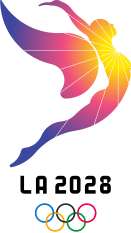 | |||
| Host city | Los Angeles, California, United States | ||
|---|---|---|---|
| Motto | Follow the Sun | ||
| Opening | July 21 | ||
| Closing | August 6 | ||
| Stadium | |||
| Summer | |||
| |||
| Winter | |||
| |||
| Part of a series on |
|
The process of bidding for the host city had originally been scheduled to begin in 2019, with the winning bid due to be announced in 2021. However, following the withdrawal of a number of cities from bidding for both the 2022 Winter Olympics[1] and the 2024 Summer Olympics,[2] the International Olympic Committee (IOC) resolved in July 2017 to jointly award both the 2024 and 2028 Games.[3] Thus on July 31, 2017, an agreement was reached whereby Los Angeles would bid for the 2028 Games with $1.8 billion of additional funding from the IOC,[4] which then cleared the way for Paris to be confirmed as host of the 2024 Games. Both cities were formally announced as winners of their respective games at the 131st IOC Session in Lima, Peru, on September 13, 2017.[5] The LA bid was praised by the IOC for using a record-breaking number of existing and temporary facilities and for relying on corporate funding.[6]
This will be the third time that Los Angeles has hosted the Summer Olympics, making it the first North American city and the third worldwide, after London (1908, 1948, and 2012) and Paris (1900, 1924, and 2024), to host the Games three times. These will be the fifth Summer Olympic Games to be hosted in the United States, the previous four being St. Louis 1904, Los Angeles 1932, Los Angeles 1984, and Atlanta 1996. These will also be the fourth Olympics to be held in the state of California, and the ninth Olympics to be held in the US overall (the four winter events being Lake Placid 1932, Squaw Valley 1960, Lake Placid 1980, and Salt Lake City 2002).
Bidding process
On September 16, 2015, the International Olympic Committee announced the candidature process and the five candidate cities for the 2024 Games: Budapest, Hamburg, Los Angeles, Paris, and Rome.[7] Budapest, Hamburg, and Rome eventually withdrew, leaving only Los Angeles and Paris. A similar situation had already occurred during the bidding for the 2022 Winter Olympics when Krakow, Lviv, Oslo and Stockholm withdrew, resulting in a two-way decision between Beijing, China and Almaty, Kazakhstan, with Beijing ultimately declared the winner. On April 3, 2017 at the IOC convention in Denmark, Olympic officials met with bid committees from both Los Angeles and Paris to discuss the possibility of naming two winners in the competition to host the 2024 Summer Games.
After these withdrawals, the IOC Executive Board met in Lausanne, Switzerland on June 9, 2017 to discuss the 2024 and 2028 bid processes.[3] The IOC formally proposed electing the 2024 and 2028 host cities at the same time in 2017, a proposal that was approved by an Extraordinary IOC Session on July 11, 2017 in Lausanne. The IOC set up a process where the Los Angeles and Paris 2024 bid committees, and the IOC, held meetings in July 2017 to decide which city would host in each of the two years.[8]
Following the decision to award the 2024 and 2028 Games simultaneously, Paris was understood to be preferred for the 2024 Games. On July 31, 2017, the IOC announced Los Angeles as the sole candidate for 2028, allowing Paris to be confirmed as the host for 2024. On August 11, 2017, Los Angeles City Council voted unanimously to approve the bid.[9] On September 11, 2017, Los Angeles received formal approval from the IOC's evaluation commission.[10] On September 13, 2017, Los Angeles was formally awarded the 2028 Games following a unanimous vote by the IOC.[11]
On October 16, 2017, Los Angeles 2028 received official support from the state of California.[12] On August 29, 2018, Olympic officials arrived for a two-day visit that included meetings with local organizers and a tour of the city's newest venues.[13] On October 9, 2018, a movement called NOlympics LA released a poll results stating that 45% of respondents from Los Angeles County and 47% from across California oppose bringing the 2028 Summer Games to Los Angeles.[14] However, a LMU, IOC, and LA Times polls suggest that more than 88% of Angelenos are in favor of the city's hosting the 2028 Olympic and Paralympic Games.[15]
Development and preparations
Venue construction and renovations
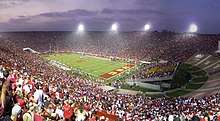
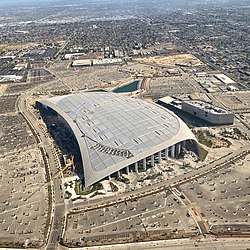
While most host cities have seven years to prepare for the Olympic Games, Los Angeles will get an additional four, giving the city eleven years. The Los Angeles bid relied on a majority of existing venues; other venues that are already under construction were planned regardless of the Games. Banc of California Stadium, which opened in 2018 as the home of Major League Soccer's Los Angeles FC, will host football (soccer) and several events in athletics. SoFi Stadium, home of the NFL's Los Angeles Rams and Los Angeles Chargers upon its completion in 2020, will host the main opening ceremony, football, and archery. Around the time when Los Angeles won its bid, the Los Angeles Clippers proposed building a new arena in Inglewood. However, this venue has not yet been approved and has yet to be mentioned as a potential Olympic venue.[16][17]
The Los Angeles Memorial Coliseum underwent a major renovation and restoration program from 2017 to 2019.[18] A new press box, loge boxes, and club seats were installed.[19] This reduced stadium capacity from 93,607 to 78,467.[20] As the track and field venue, future renovations include the re-installation of an athletics track.
Infrastructure
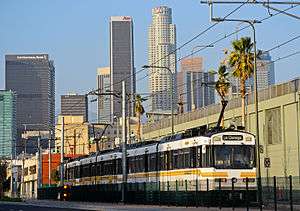
The Twenty-eight by '28 initiative is an effort set forth by Mayor Eric Garcetti that the City of Los Angeles complete 28 transit infrastructure projects before the start of the games.[21] Most of these projects were already in the planning stages but will receive accelerated priority, while several new projects were programmed with the initiative.
As of 2019, the Crenshaw/LAX Line is expected to open and will be fully completed by 2021. It will link the Crenshaw District, Inglewood and Westchester once completed. The Crenshaw/LAX line will also connect to a people mover being constructed to link Los Angeles International Airport with the Aviation/96th Street station. The construction of the people mover will be expedited in anticipation of the 2028 Olympics, with a completion date of 2023 being set.[22] The LAX people mover started construction in early 2018 and the Crenshaw Line is currently 75% completed (as of March 2018).[23] The Inglewood Transit Connector is another people mover planned to provide transportation between the Crenshaw line and the Olympic venues in Inglewood.
While various infrastructure improvements were planned regardless of the outcome of the Los Angeles Olympic bid, the extension of the Metro D Line will be expedited to serve the 2028 Olympics. Three phases were created to extend the line. The first phase will extend the Purple Line from the Wilshire/Western station to the new Wilshire/La Cienega station. This phase will be completed by 2023. The second phase will extend the Purple Line to Century City by 2025, while the third and final phase will extend the line to the West Los Angeles VA Medical Center in Westwood with a completion date set for 2026. The third phase will also include a station adjoining the UCLA campus, connecting the Olympic village and Pauley Pavilion with venues in downtown Los Angeles.[24][25] Currently phase one, two and three broke ground and are under construction. Phase 3 did not have a "ground breaking ceremony", but did receive its federal funding grants in February 2020. Construction began in 2019 and remains on schedule. [24] [26][27]
The Regional Connector in downtown Los Angeles will be complete in 2021. The project will connect the Metro E Line, which already links venues in Downtown Santa Monica to venues at Exposition Park and in downtown Los Angeles, to the Metro L Line. This will allow for direct rail service between Santa Monica and East Los Angeles. The Regional Connector will also link the Metro A Line with the Metro L Line, connecting the Long Beach area and San Gabriel Valley via downtown.[28][29]
These infrastructure improvements, among others, are being funded by "Measure R", a temporary half-cent sales tax increase, and "Measure M", a continuation of Measure R's tax increase plus an additional permanent half-cent sales tax increase, both tax measures applicable to Los Angeles County.[30] Measure R was approved by voters in November 2008 and Measure M was approved by voters in November 2016.[30]
Budget
In April 2019, the estimated cost of the Games was assessed as being approximately $6.88 billion with all the money coming from the private sector, although the Los Angeles city council and state of California legislators have agreed to serve as a “financial backstop.” The organizers adjusted the budget for inflation after L.A., which originally bid for the 2024 Games, agreed to wait four more years.[31][32]
The City of Los Angeles is the lead public guarantor, committing to spend up to $250 million to cover shortfalls. In 2016, the California legislature took action so that the Governor is empowered to negotiate the next $250 million in public backup, but only after the city backup money has been used first. LA 2024 also agreed to purchase a wide-range of insurance policies including natural disaster, terrorism, event cancellation, as well as reduced ticket sales.[32]
The Federal government will designate the Olympics a National Special Security Event (NSSE) in which the U.S. Secret Service heads a single chain of command.[32] The U.S. federal government will also cover the cost of security, with an agreement signed by LAOOC and Department of Homeland Security in February 2020. The federal government will not be involved in the funding of the Games themselves, covering only security costs.[33]
Venues
Under present IOC policy, venues with corporate naming rights will not be allowed to use their sponsored name during the Olympics.[34]
Downtown Los Angeles Sports Park
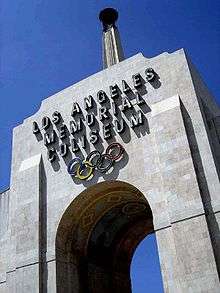
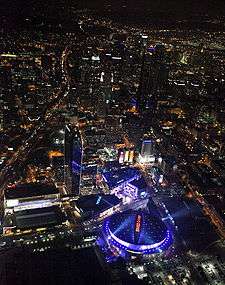

The Downtown Los Angeles sports park will incorporate various venues around downtown Los Angeles. Multiple venues will be located at LA Live, Exposition Park and the campus of the University of Southern California.
| Venue | Events | Capacity | Status |
|---|---|---|---|
| Figueroa Street[35] | Live site: "Olympic Way" – Street art, vendors and entertainment connecting USC and L.A. Live in Downtown Los Angeles | N/A | Existing |
| Los Angeles Memorial Coliseum | Athletics (except some field events) | 78,467 | |
| Opening/Closing ceremonies | |||
| Banc of California Stadium | Football (preliminaries, quarterfinals, women's 3rd place) | 22,000 | |
| Athletics (discus, javelin and hammer first rounds) | 20,000 | ||
| Dedeaux Field (USC) | Swimming, Diving, Synchronized swimming | 20,000 | Temporary structure on existing site |
| Galen Center (USC) | Badminton | 10,300 | Existing |
| Karate | |||
| Los Angeles Convention Center | Basketball (women's preliminaries) | 8,000 | |
| Boxing | 8,000 | ||
| Fencing | 7,000 | ||
| Taekwondo | |||
| Table tennis | 5,000 | ||
| BMX freestyle | 8,000 | ||
| Staples Center | Basketball (men's preliminaries, finals) | 18,000 | |
| Microsoft Theater | Weightlifting | 7,000 | |
| USC Village | Media Village | N/A | |
| Grand Park | Marathon | 5,000 | |
| Race walk | |||
| Road cycling |
Valley Sports Park
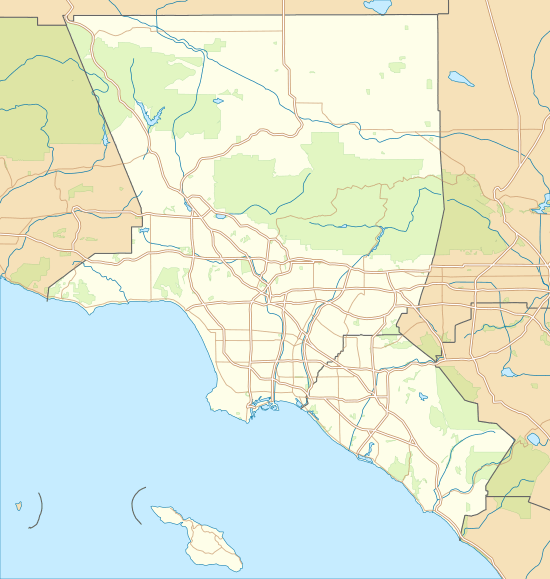
The Valley Sports Park will be centered around the Sepulveda Dam in the San Fernando Valley.
| Venue | Events | Capacity | Status |
|---|---|---|---|
| Sepulveda Basin Park | Canoe slalom | 8,000 | Planned construction |
| Equestrian | 15,000 | Temporary | |
| Shooting | 3,000 |
South Bay Sports Park
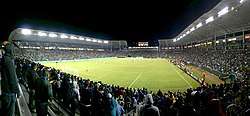
The South Bay Sports Park will be located on the campus of California State University, Dominguez Hills in Carson, California.
| Venue | Events | Capacity | Status |
|---|---|---|---|
| Dignity Health Sports Park - Main Stadium | Rugby | 30,000 | Existing |
| Modern pentathlon (excluding fencing) |
30,000 | ||
| Dignity Health Sports Park - Tennis Stadium | Tennis | 10,000 (Center Court) | |
| Dignity Health Sports Park - Track and Field Facility | Field hockey | 15,000 (primary field) 5,000 (secondary field) | |
| VELO Sports Center | Track cycling | 6,000 | |
| Modern pentathlon (fencing) | 6,000 |
Long Beach Sports Park
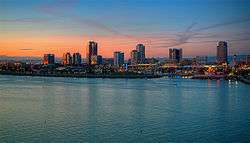
The Long Beach Sports Park will be located in and around Downtown Long Beach in Long Beach, California.
| Venue | Events | Capacity | Status |
|---|---|---|---|
| Long Beach Waterfront | BMX racing | 6,000 | Temporary |
| Water polo | 8,000 | ||
| Triathlon | 2,000 | Existing | |
| Open water swimming | 2,000 | ||
| Long Beach Arena | Handball | 12,000 | |
| Belmont Veterans Memorial Pier | Sailing | 6,000 |
Westside
Various venues in the Westside of Los Angeles, CA.
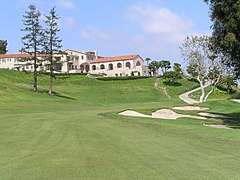
| Venue | Events | Capacity | Status |
|---|---|---|---|
| Santa Monica State Beach and Venice Beach | Beach volleyball | 12,000 | Temporary |
| Skateboarding | 10,000 | Existing | |
| Surfing | 8,000 | ||
| 3x3 basketball | |||
| Riviera Country Club | Golf | 30,000 | |
| UCLA | Olympic Village and Olympic Village Training Center |
N/A | |
| Pauley Pavilion (UCLA) | Wrestling | 12,500 | |
| Judo | 12,500 | ||
| SoFi Stadium | Opening/Closing ceremonies | 70,000 – 100,000 | Under construction |
| Football (men's quarterfinals, women's semifinals, men's final) | 70,000 – 100,000 | ||
| Archery | 8,000 (stadium lake) | ||
| The Forum | Gymnastics | 17,000 | Existing |
Southern California venues
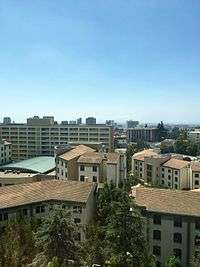
| Venue | Location | Events | Capacity | Status |
|---|---|---|---|---|
| Rose Bowl | Pasadena | Football (women's quarterfinals, men's semifinals, women's final, men's 3rd place) | 92,000 | Existing |
| Lake Perris | Riverside County | Canoe sprint | 12,000 | |
| Rowing | 12,000 | |||
| Frank G. Bonelli Regional Park | San Dimas | Mountain biking | 3,000 | Temporary |
| Dodger Stadium | Los Angeles | Baseball/Softball | 56,000 | Existing |
| Angel Stadium | Anaheim | 45,000 | ||
| Honda Center | Volleyball | 18,000 | ||
| Anaheim Convention Center (The Arena at Anaheim) |
6,000 | |||
| KNBC Universal Studios Lot | Universal City | IBC/MPC[36] |
Potential football venues
_(cropped).jpg)
According to the initial bid book for the Los Angeles 2024 Olympics, football venues are to be situated within Los Angeles Metropolitan Area and other main cities of California. It is the responsibility of the organizing committee to choose from four to six venues to host the tournament. According to the official website of the local organizing committee, eight venues are under consideration, all within California.[37]
- Potential venues in Los Angeles County
- Rose Bowl, Pasadena (92,542 capacity) – 3 group matches, quarterfinals, semifinals and women's final
- SoFi Stadium, Inglewood (72,000) – 3 group matches, quarterfinals, semifinals and men's final
- Banc of California Stadium, Exposition Park (22,000) – 8 group matches
- Potential venues in the San Francisco Bay area
- Levi's Stadium, Santa Clara (68,500) – 5 group matches, quarterfinals, and men's bronze medal match
- California Memorial Stadium, Berkeley (63,000) – 8 group matches
- Stanford Stadium, Stanford (50,000) – 5 group matches, quarterfinals and women's bronze medal match
- Earthquakes Stadium, San Jose (20,000) – 8 group matches
- Potential venues in San Diego County
- New Aztec Stadium, San Diego (32,000) – 8 group matches
The Games
Ceremonies
In January 2017, it was reported that the LA 2028 organizing committee had proposed the use of both the new SoFi Stadium in Inglewood, California, and the historic Los Angeles Memorial Coliseum, during the opening and closing ceremonies. The committee proposed that a segment of the opening ceremony be held at the Coliseum, including launch of the final stage of the torch relay. The torch would then travel on to Inglewood, where the main opening ceremony (including the parade of nations and other traditional protocol) would be held. Other entertainment would be provided to spectators at the Coliseum, including a simulcast of the main portion of the ceremony. Finally, the historic Olympic cauldron at the Coliseum would symbolically be re-ignited upon lighting of the Olympic cauldron in Inglewood. Sixteen days later, the venues for the closing ceremony would be organized in reverse, with an opening segment in Inglewood and the formal protocol (including extinguishing of the cauldron) at the Coliseum.[38]
Broadcasting rights
In the United States, the 2028 Games will be broadcast by NBCUniversal properties, as part of long-term agreements with the IOC through 2032.[39] The Universal Studios Lot is planned to be the site of the International Broadcast Centre for the Games.[36] In addition, NBCUniversal and the organizing committee will coordinate sponsorship sales for the Games.[40]





See also
- 2028 Summer Paralympics
- Olympic Games celebrated in the United States
- 1904 Summer Olympics – St. Louis
- 1932 Summer Olympics – Los Angeles
- 1932 Winter Olympics – Lake Placid
- 1960 Winter Olympics – Squaw Valley
- 1980 Winter Olympics – Lake Placid
- 1984 Summer Olympics – Los Angeles
- 1996 Summer Olympics – Atlanta
- 2002 Winter Olympics – Salt Lake City
- 2028 Summer Olympics – Los Angeles
References
- Abend, Lisa (October 3, 2014). "Why Nobody Wants to Host the 2022 Winter Olympics". Time. Archived from the original on September 18, 2015. Retrieved September 20, 2015.
- Butler, Nick. "Exclusive: IOC vow to "further adjust" candidature process after Budapest 2024 withdrawal". Inside the Games. Archived from the original on August 1, 2017. Retrieved August 1, 2017.
- "Meeting of the IOC Executive Board in Lausanne – Information for the media". Olympic.org. 19 May 2017. Archived from the original on 22 June 2017.
- "Los Angeles Declares Candidature for Olympic Games 2028- IOC to Contribute USD 1.8Billion to the Local Organising Committee". IOC. Archived from the original on August 1, 2017. Retrieved August 1, 2017.
- Wharton, David. "Los Angeles makes deal to host 2028 Summer Olympics". Los Angeles Times. Archived from the original on September 22, 2017. Retrieved July 31, 2017.
- "IOC makes historic decision by simultaneously awarding Olympic Games 2024 to Paris and 2028 to Los Angeles". International Olympic Committee. September 13, 2017. Archived from the original on July 17, 2019. Retrieved October 4, 2019.
- "Candidature Process Olympic Games 2024" (PDF). Archived (PDF) from the original on December 22, 2015. Retrieved March 1, 2017.
- "Bach Says Paris and LA Mayors Are 'Optimistic' About Agreement After Initial Discussions - GamesBids.com". gamesbids.com. Archived from the original on August 1, 2017. Retrieved August 1, 2017.
- "L.A. City Council endorses 2028 Olympics bid, accepting responsibility for any cost overruns". Los Angeles Times. August 2017. Archived from the original on February 28, 2020. Retrieved August 11, 2017.
- "Los Angeles gets official go-ahead to host 2028 Olympics". Chicago Tribune. September 2017. Archived from the original on July 15, 2018. Retrieved September 11, 2017.
- "L.A. officially awarded 2028 Olympic Games". Los Angeles Times. September 2017. Archived from the original on May 7, 2020. Retrieved September 13, 2017.
- "State taxpayers will back L.A. Olympics bid if it goes over budget". Los Angeles Times. October 2017. Archived from the original on October 18, 2017. Retrieved October 17, 2017.
- "Olympic officials visit L.A. for the first time since awarding the bid and are impressed so far with what's to come". Los Angeles Times. August 2018. Archived from the original on August 29, 2018. Retrieved August 29, 2018.
- "New poll suggests L.A. residents concerned about hosting 2028 Olympics". Los Angeles Times. October 9, 2018. Archived from the original on October 12, 2018. Retrieved October 12, 2018.
- "LA 2024 Olympic bid receives wide public support in new poll". Los Angeles Times. February 23, 2016. Retrieved February 23, 2016.
- reports, From NBA media. "LA Clippers owner Steve Ballmer still seeking Inglewood arena for team - NBA.com". nba.com. Archived from the original on August 17, 2018. Retrieved August 17, 2018.
- "Inglewood residents sue to block Clippers arena". curbed.com. Archived from the original on July 24, 2018. Retrieved August 17, 2018.
- "See the Changes Coming to the Historic LA Memorial Coliseum". NBCUniversal Media. January 29, 2018. Archived from the original on March 23, 2018. Retrieved March 22, 2018.
- "Renovated Coliseum Press Box to be Named Otis Booth Press Box". The Coliseum Renovation Project. Archived from the original on April 14, 2018. Retrieved April 14, 2018.
- "United Airlines Memorial Coliseum to be new name for L.A. landmark - USC News. January 29, 2018". www.usc.edu. Archived from the original on August 6, 2018. Retrieved August 20, 2018.
- Sharp, Steven (November 27, 2018). "Here are the 28 Projects that Metro Could Complete Before the 2028 Olympics". Urbanize. Archived from the original on June 29, 2018. Retrieved July 2, 2018.
- "Renderings Galore for the LAX Automated People Mover". Urbanize.la. February 2018. Archived from the original on February 23, 2018. Retrieved February 25, 2018.
- "Agenda for March 22 meeting of Metro Board of Directors". metro.net. March 21, 2018. Archived from the original on March 23, 2018. Retrieved March 22, 2018.
- "Purple Line phase 2 groundbreaking!". metro.net. February 23, 2018. Archived from the original on February 24, 2018. Retrieved February 25, 2018.
- Nelson, Laura J. (September 9, 2015). "Eyeing L.A.'s Olympic bid, Metro seeks to accelerate two rail projects". Los Angeles Times. Archived from the original on September 12, 2015. Retrieved September 12, 2015.
- "Purple Line Extension". Metro. Archived from the original on September 29, 2019. Retrieved October 4, 2019.
- http://libraryarchives.metro.net/DPGTL/StatusReports/2020-january-westside-purple-line-extension-section-3.pdf
- Devanney, Brenna (November 12, 2015). "Metro Proposes Budget Changes To Regional Connector". Annenberg TV News. Archived from the original on February 2, 2016. Retrieved January 24, 2016.
- "Regional Connector Transit Corridor (project website)". Metro (LACMTA). May 13, 2013. Archived from the original on April 14, 2020. Retrieved July 11, 2013.
- "Los Angeles County Election Results". Los Angeles County Registrar-Recorder/County Clerk. December 2, 2016. Archived from the original on July 4, 2018. Retrieved October 4, 2019.
- Wharton, David (April 30, 2019). "Estimated cost of 2028 Los Angeles Olympics jumps to $6.9 billion". Los Angeles Times. Archived from the original on June 27, 2019. Retrieved June 29, 2019.
- "Update on Los Angeles' Bid for the 2024 Olympics". California Legislative Analyst's Office. March 23, 2017. Archived from the original on June 1, 2019. Retrieved June 18, 2020.
- "President Trump confirms government will assist L.A. during 2028 Olympics". Los Angeles Times. February 2020. Retrieved February 18, 2020.
- Murphy, Bill, Jr. "United Airlines Spent $69 Million on This Stadium Naming Deal, But They're Not Getting This 1 Important Thing". Inc. Archived from the original on June 18, 2018. Retrieved September 17, 2019.
- "Stage 1 Vision, Games Concept and Strategy" (PDF). Archived (PDF) from the original on October 12, 2016. Retrieved July 1, 2017.
- Johnson, Ted (June 22, 2016). "Universal to Build New Soundstage Complex, Expand Theme Park in 5-Year Plan (EXCLUSIVE)". Archived from the original on August 27, 2016.
- "LA2024 Games Delivery, Experience and Venue Legacy" (PDF). Archived (PDF) from the original on February 4, 2017.
- Wharton, David (January 16, 2017). "L.A. organizers propose linked, simultaneous Olympic ceremonies for Coliseum, Inglewood stadium". Los Angeles Times. Archived from the original on January 16, 2017. Retrieved August 25, 2017.
- "IOC awards Olympic Games broadcast rights to NBCUniversal through to 2032". International Olympic Committee. May 7, 2014. Archived from the original on June 30, 2016. Retrieved August 27, 2017.
- "LA 2028 and NBCUniversal partner for Olympic sponsorship sales". SportsPro. Retrieved April 18, 2019.
- "IOC reaches agreement for broadcast rights in Brazil with Grupo Globo through to 2032". International Olympic Committee. Olympic.org. 10 December 2015. Archived from the original on 13 December 2015. Retrieved 11 December 2015.
- "IOC awards broadcast rights to the Japan Consortium through to 2032". IOC. Olympic.org. November 14, 2019. Archived from the original on November 14, 2019. Retrieved November 14, 2019.
- "IOC awards 2026-2032 Olympic Games broadcast rights in Korea to JTBC". International Olympic Committee. Olympic.org. June 4, 2019. Archived from the original on June 4, 2019. Retrieved June 4, 2019.
External links
Candidature files
- Stage 1: Vision, Games Concept and Strategy
- Stage 2: Governance, Legal and Venue Funding
- Stage 3: Games Delivery, Experience and Venue Legacy
| Preceded by Paris |
XXXIV Olympiad Los Angeles 2028 |
Succeeded by TBD |